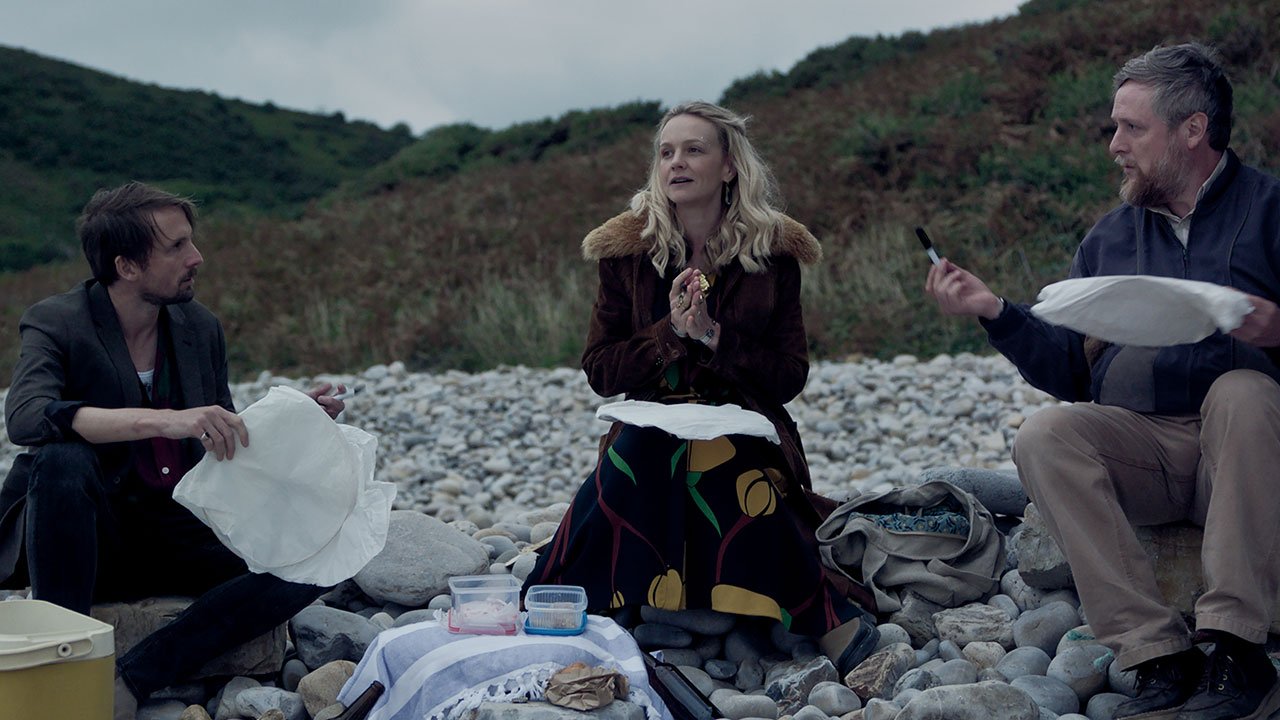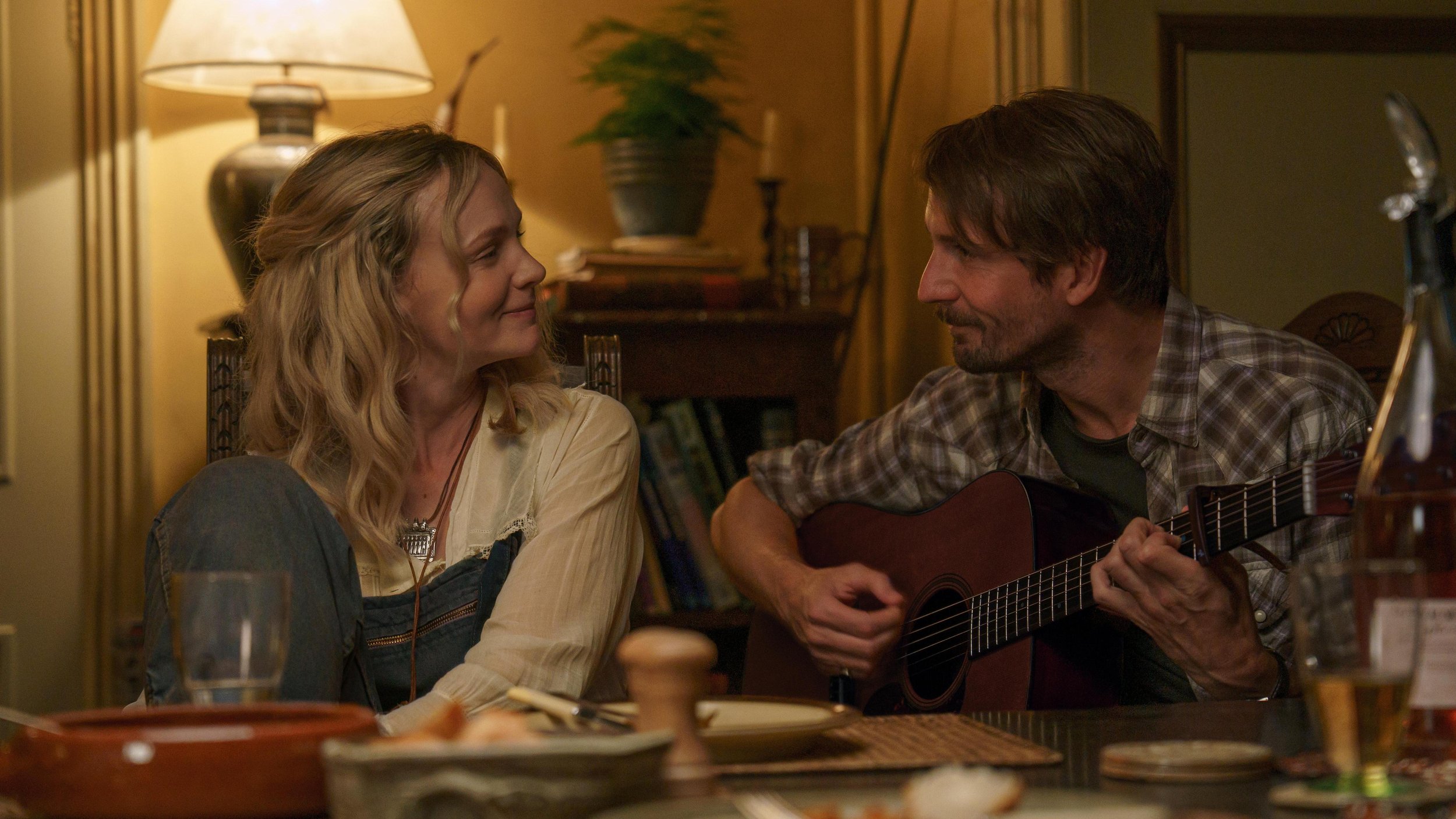
The Ballad of Wallis Island
April 2, 2025 / Kevin Ward — ★★★★½
The Ballad of Wallis Island eases into view with the gentle rhythm of a film that knows its strengths—quaint, funny, and quietly affecting. It's the kind of story that unfolds with the softness of a well-worn sweater, content to move at its own pace. Directed by James Griffiths and penned by longtime collaborators Tom Basden and Tim Key, it's a film that wears its charm lightly, trusting that its blend of quiet heartbreak, droll humor, and the bittersweet echo of a faux folk-pop past will find resonance without pushing too hard.
Basden plays Herb McGwyer, a once-relevant singer-songwriter now adrift in his own solo career. He arrives by boat to the remote titular island for a mysterious gig, only to find no dock, entourage, or clear direction. Forced to wade thigh-deep through cold water to get to shore—his suitcase overhead like some half-hearted baptism—Herb's skepticism calcifies. The man awaiting him, Charles (Tim Key, phenomenal), offers no clarity, just an insistent cheerfulness and vague assurances: "Not much further," he says when Herb asks how far the "hotel" is. There is no hotel. Only Charles' slightly crumbling estate and an unpaid promise of something more meaningful.
Charles is a two-time lottery winner who has used his considerable fortune to orchestrate what he believes is a perfect, poetic event: the reunion of McGwyer and Mortimer, a beloved musical duo long since defunct after a bitter split. Unbeknownst to Herb, Carey Mulligan's Nell Mortimer is also en route. She brings her new life (and new husband) with her.
Key, always calibrated just right, plays Charles not as a quirky punchline but as someone whose cheeriness is clearly holding something heavier at bay. There's something both hilarious and quietly sad about the whole setup—a man who wins the lottery twice and uses it not for yachts or penthouses but to reunite a band that broke up years ago. The comedy works because it's rooted in something genuine; Key's delivery lands not just because the lines are sharp (they are) but because you sense Charles means every word, even when he's dodging the truth. "Audience of less than 100," he quips, and it gets a laugh—because we now understand what it really means, even if Herb doesn't. There's humor in the line, but it also hints at something deeper. Here's a man who can afford anything, yet he hasn't invited a single soul to share in this moment. It poses an unspoken question—why stage such a personal, elaborate event in total solitude? As we spend more time with Charles, the answer emerges that this isn't really about music. It's about trying to recreate something that's already slipped away and hoping, maybe foolishly, that it can still be found.
Nell arrives on the island with her husband (Akemnji Ndifornyen) in tow, already fully aware of the context surrounding their supposed "show," while Herb is still piecing it together. The chemistry between Mulligan and Basden is extremely well-calibrated, suggesting a long, complicated shared history that doesn't need to be explained aloud. There's a tension in how much affection still lingers between them, even as their rhythms are clearly out of sync. Herb flinches at the idea of revisiting their old material—it belongs to a chapter he'd rather leave closed. Nell, more fluent in the emotional ruins, coaxes him forward with the grace of someone who's already mourned the loss. When Herb and Nell finally harmonize, it's not an act of catharsis but one of reluctant acknowledgment. The music doesn't resolve their story; it sharpens the outlines of its absence. The film lets that ache settle, and in doing so, sidesteps sentimentality in favor of something stranger and sadder—and better.
Basden and Key's script resists the easy arc, pulling away from a tidy reunion plot toward something lonelier and more uncertain. What looks like a light-footed farce—an elaborate scheme to reunite a musical duo—gradually reveals itself as a character study in grief, stubbornness, and the thin line between preservation and paralysis. Charles hasn't just built a tribute to his late wife on Wallis Island; he's marooned himself in it. His plan to resurrect McGwyer and Mortimer is less a romantic gesture than a desperate one—a way to replay something that once felt alive. In that sense, he and Herb are mirrors: both caught in the loop of what used to be, convinced that if they can just find the right chord, it'll all come back into focus.
Griffiths' direction is restrained, allowing the actors to breathe and the setting—lush, melancholy, a little unkempt—to do some of the heavy lifting. G. Magni Ágústsson's cinematography captures the fictional Wallis Island as a place of rugged isolation and solemn, untamed beauty—gorgeous and slightly wild, with a mood that mirrors the emotional drift of its characters.
I absolutely loved this film. It's tender and eccentric in a way that creeps up on you, slowly revealing the heartbreak beneath the humor. Tim Key delivers one of the funniest performances I've seen in ages—his timing, commitment to the bit, and vulnerability all land with an effortless charm that makes Charles unforgettable. A musical and melancholic quality to the whole thing brought to mind John Carney's work—Once and Begin Again—though a little less Irish, leaning more into British eccentricities. The Ballad of Wallis Island belongs to that lineage: a film about music and memory but also about the impossibility of going back, even when every part of you wants to try.
Director: James Griffiths
Screenplay: Tom Basden, Tim Key
Cast: Carey Mulligan, Tom Basden, Tim Key, Sian Clifford, Akemnji Ndifornyen
Producer: Rupert Majendie
Runtime: 100 minutes
Rated: PG-13

